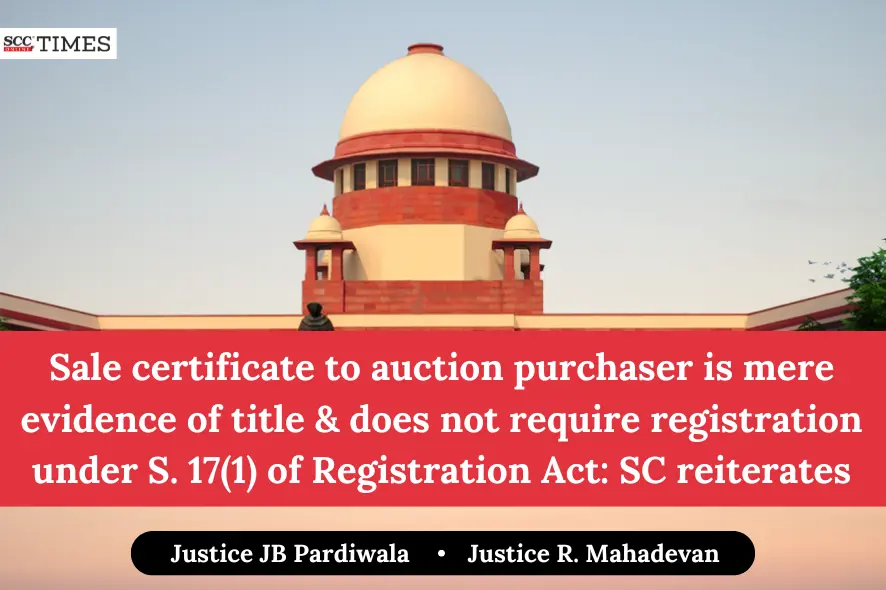Supreme Court: In a civil appeal against the decision of Punjab and Haryana wherein the Writ Petition filed by the Ferrous Alloy Forgings Pvt. Ltd. (‘Respondent 1’) was allowed and the Respondent 2 was directed to handover the original sale certificate to Respondent 1 and send a copy of the same to the Sub-Registrar under Section 89(4) of the Registration Act, 1908 (‘Registration Act’), the Division Bench of JB Pardiwala and R. Mahadevan, JJ. dealt with the issue- whether the successful auction purchaser must deposit the stamp duty for the sale certificate to be issued to it given the provisions of the Stamp Act and the Registration Act. The Court reiterated that mere filing under Section 89(4) of the Registration Act itself is sufficient when a copy of the sale certificate is forwarded by the authorised officer to the registering authority. However, on perusing Articles 18 and 23 of the first schedule to the Stamp Act. As long as the sale certificate remains as it is, it is not compulsorily registrable and it is only when the auction purchaser uses the certificate for some other purpose that the requirement of payment of stamp duty, etc. would arise.
Background
Punjab United Forge Limited was ordered to be wound up by the High Court under the provisions of the Companies Act, 1956 (‘the Act, 1956’) and permission was granted to Industrial Finance Corporation of India (IFCI) to sell the properties mortgaged with it and also the properties hypothecated with Andhra Bank. Consequently, IFCI invited tenders for the auction of immovable and movable assets wherein a sister concern of Respondent 1 offered the highest bid and as a result the auction sale was confirmed, first by the official liquidator and later by the High Court in favour of Respondent 1. Thereafter, Respondent 1 moved an application requesting for execution of the conveyance deed in its favour on the ground that the entire sale consideration was paid by it and also the Board of Directors and Chairman were the same for both Respondent 1 and its sister concern. However, the Company Judge of the High Court declined the request. An intra-court appeal against the same was filed before a Division Bench of the High Court which came to be allowed. The High Court held Respondent 1 was liable to pay the stamp duty on the immovable properties which had been put to auction including land, buildings and permanently affixed machinery thereto. The High Court also viewed that although the immovable properties which were put to auction were to be included in the certificate of transfer, their value would be excluded for computation of stamp duty.
When Respondent 1 submitted an additional affidavit, the Registrar viewed that stamp duty had to be paid on Rs. 2.25 crore which was the valuation of the immovable properties as offered in the tender. A challenge was raised to this before the High Court, wherein the High Court dealt with- whether a sale certificate issued in pursuance to a Court’s auction is required to be stamped.” The High Court allowing the plea ruled that there was no occasion for fixation of stamp duty at the time of issuance of the sale certificate and the Registry of the High Court was only required to issue the sale certificate and send a copy of the same to the Sub-Registrar in accordance with the mandate contained in Section 89(4) of the Registration Act. The High Court further observed that whether the certificate is to be stamped or not would be the responsibility of the successful auction purchaser. The High Court directed that the original sale certificate be handed over to the Respondent 1 and a copy of the same be sent to the Sub-Registrar under Section 89(4) of the Registration Act and that the stamp duty deposited by the Respondent 1 be refunded within a period of one month. Hence, the present appeal by the State.
Analysis and Decision
The Court noted that in Municipal Corpn. of Delhi v. Pramod Kumar Gupta, (1991) 1 SCC 633, it was discussed that owners and certain other interested persons are afforded opportunity under the CPC to assail the sale and make a prayer for setting aside the sale on certain enumerated grounds, however, once such objections are disposed of without disturbing the sale, the sale stands confirmed under Order XXI Rule 92 of the CPC. Thereafter, the sale certificate is issued under Order XXI Rule 94. The Court therein, laid down that this chronology makes it clear that the transfer becomes final when an order under Rule 92 of Order XXI is made and the issuance of a sale certificate under Rule 94 is only a formal declaration of the effect of such confirmation. Hence, it was ruled that such issuance of certificate does not create or extinguish any title and thus would not attract any stamp duty which is applicable qua an instrument of sale of immovable property.
Further, the Court relied on B. Arvind Kumar v. Govt. Of India (2007) 5 SCC 745, and reiterated that a sale certificate issued to the purchaser in pursuance of the confirmation of an auction sale is merely evidence of such title and does not require registration under Section 17(1) of the Registration Act. The Court stated that — “it is not the issuance of the sale certificate which transfers the title in favour of the auction purchaser. The title is transferred upon successful completion of the sale and its confirmation by the competent authority after all the objections against the sale have been disposed of.”
The Court also relied on Inspector General of Registration v. G. Madhurambal 2022 SCC Online SC 2079, wherein the consistent position of law that a certificate of sale cannot be regarded as a conveyance subject to stamp duty was reiterated. The Court reiterated that a sale certificate issued by the authorised officer is not compulsorily registrable. Mere filing under Section 89(4) of the Registration Act itself is sufficient when a copy of the sale certificate is forwarded by the authorised officer to the registering authority. However, on perusing Articles 18 and 23 of the first schedule to the Stamp Act, the Court noted that it makes it clear that when the auction purchaser presents the original sale certificate for registration, it would attract stamp duty in accordance with the said Articles.
As long as the sale certificate remains as it is, it is not compulsorily registrable. It is only when the auction purchaser uses the certificate for some other purpose that the requirement of payment of stamp duty, etc. would arise.
CASE DETAILS
|
Citation: Appellants : Respondents : |
Advocates who appeared in this case For Petitioner(s): For Respondent(s): |
CORAM :








